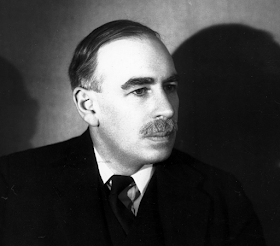Last Thursday we
looked at how cutting consumption to accumulate savings, far from being the
only way to finance new capital formation, actually throws the entire financial
and economic system into a cocked hat and causes a failure of Say’s Law of
Markets to operate . . . although why the hat has to be cocked instead of a gun
remains a mystery. Either does the
damage.
 |
| "C'm on, Uncle Milty, let my law work!" |
We closed by
noting that there is a way to finance new capital formation so that greed need
no longer be perceived as somehow “good,” despite the gospel of greed spread by
Milton Friedman and others, and Say’s Law work again so that production and consumption
will be in balance.
And that way is .
. . ?
Removing barriers
that inhibit or prevent ordinary people from purchasing capital that pays for
itself out of its own future earnings.
It’s called “Capital Homesteading”:
Capital Homestead Act Summary
 |
| "But...but...but...you need inflation to have full employment!" |
The Capital
Homestead Act is a comprehensive national economic strategy for empowering
every American citizen, including the poorest of the poor, with the means to
acquire, control and enjoy the fruits of productive corporate assets.
This long-range
agenda involves major restructuring of our tax system and our Federal Reserve
policies to lift unjust artificial barriers to more equitable distribution of
future corporate capital and faster growth rates of private sector investment.
It would shift primary national income maintenance policies from inflationary
wage and unproductive income redistribution expedients to market-based
ownership sharing and dividend incomes.
The Capital
Homestead Act’s central focus is the democratization of capital (productive)
credit. By universalizing citizen access to direct capital ownership through
access to interest-free productive credit, it would close the power and
opportunity gap between today’s haves and have-nots, without taking away
property from today’s owners.
Goals of the Capital Homestead Act
 |
| "No, no! I said DEATH and taxes!" |
The Capital
Homestead Act is designed to:
1) Generate
millions of new private sector jobs by lifting ownership-concentrating Federal
Reserve credit barriers in order to accelerate private sector growth linked to
expanded ownership opportunities, at a zero rate of inflation.
2) Radically
overhaul and simplify the Federal tax system to eliminate budget deficits and
ownership-concentrating tax barriers through a single rate tax on all
individual incomes from all sources above basic subsistence levels. Its tax
reforms would:
a) eliminate
payroll taxes on working Americans and their employers;
b) integrate
corporate and personal income taxes; and
c) exempt from
taxation the basic incomes of all citizens up to a level that allows them to
meet their own subsistence needs and living expenses, while providing “safety
net” vouchers for the poor.
3) Restructure
inheritance and gift taxes (“death taxes”) to discourage transfers from one
generation to the next, of “excessive” concentrations of wealth (i.e., when the
income generated by one’s capital far outstrips one’s capacity to consume the goods
and services of others, and where one’s unconsumed income is simply reinvested
in more capital acquisitions, resulting eventually in the monopolization of
future capital ownership opportunities by the already wealthy). In order to
promote individual initiative, capital self-sufficiency and limited economic
power of the state, inheritance policy should encourage the broadest possible
distribution of private property ownership in income-producing assets.
Tomorrow we’ll
take a look at some Capital Homesteading “Vehicles” for democratizing access to
capital ownership.
#30#
